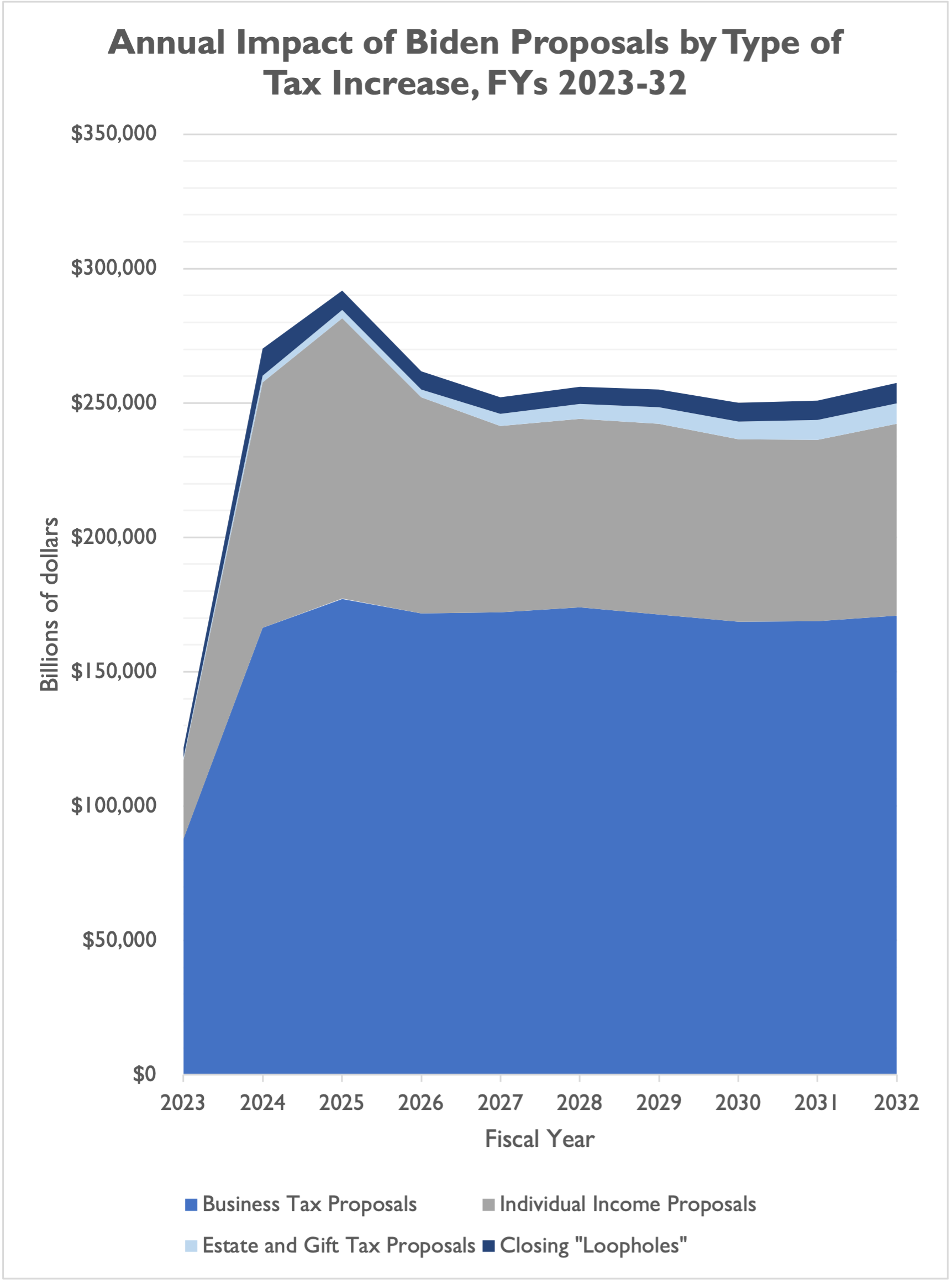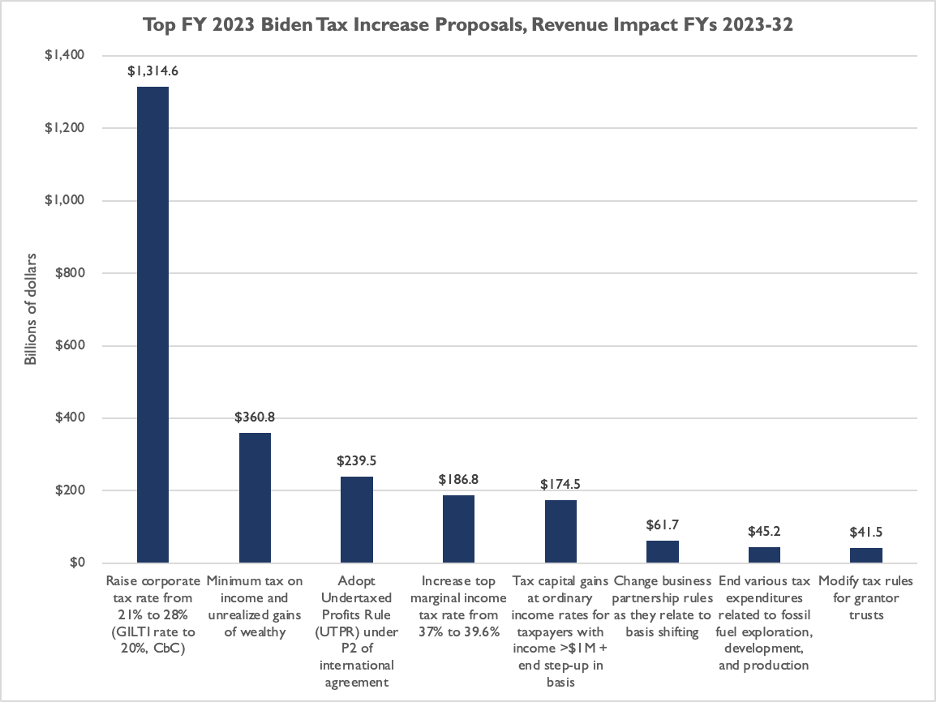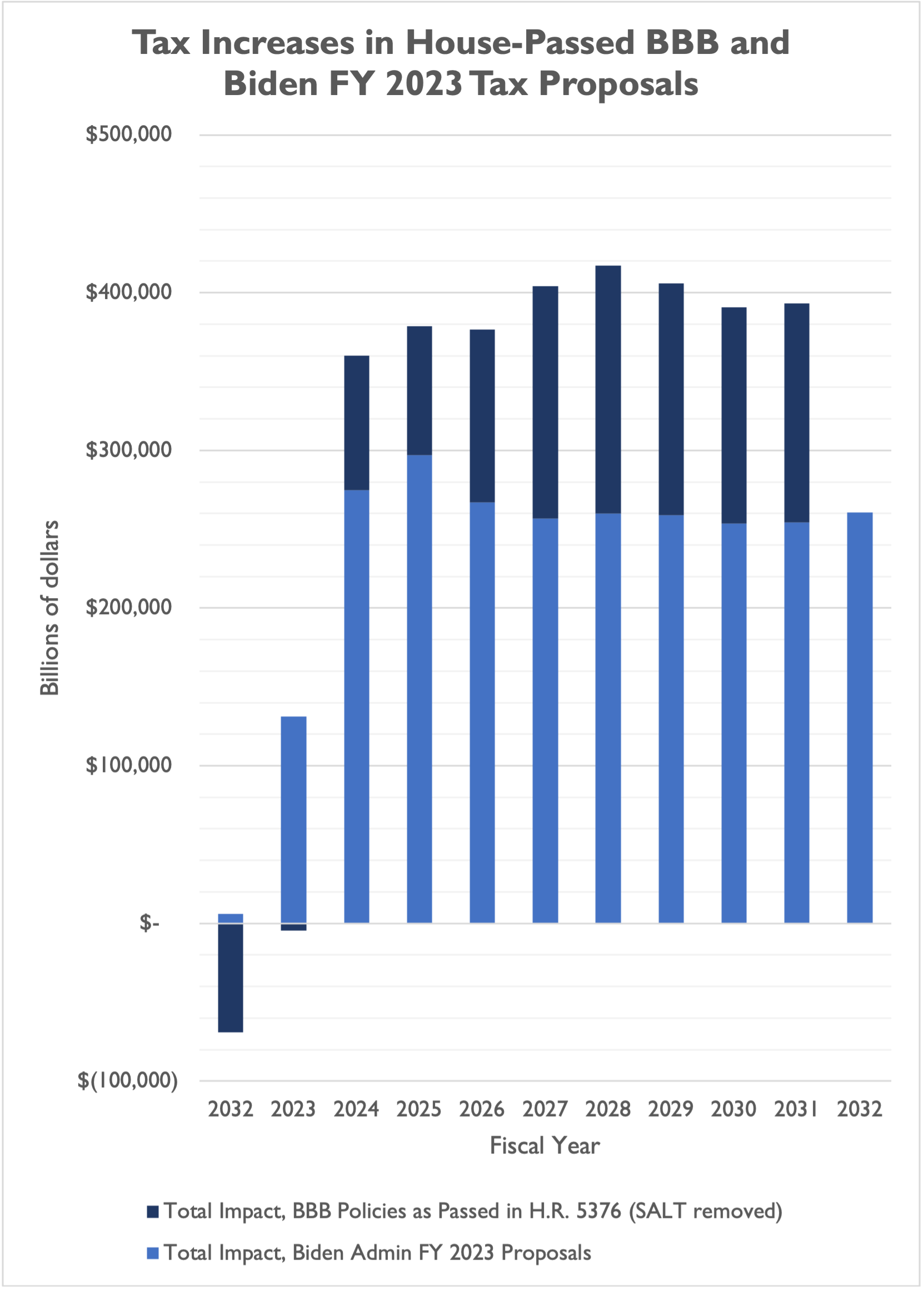President Biden just released his fiscal year (FY) 2023 federal budget proposal, and while Congress will likely reject many of the proposals embedded in the President’s budget the document serves as an important discussion piece for policymakers in the weeks and months ahead. From a taxpayer perspective, it is important to consider that Biden’s total fiscal blueprint would raise taxes by nearly $3.5 trillion.
(For more on the Biden budget proposal, see here and here from NTU, and here from NTU Foundation.)
Accompanying the Biden budget proposal is a 120-page document from the Treasury Department outlining “General Explanations of the Administration’s Fiscal Year 2023 Revenue Proposals,” informally known as the Green Book. The Green Book contains detailed descriptions of each of the President’s new proposals to increase or reduce federal revenue collections, and offers the administration’s estimate of how much these proposals will increase or reduce revenues relative to baseline assumptions over the next 10 years.
NTU and NTU Foundation will have plenty to say about specific Green Book proposals in the weeks and months to come, but this analysis serves as an initial look at the topline estimates for various revenue proposals in the administration’s new budget.
First, an important caveat about how the administration measures its revenue estimates in the FY 2023 Green Book: the Treasury Department notes that its baseline assumes that the House-passed version of the Build Back Better Act (BBB) is actually law, after subtracting revenue estimates from a proposal in that bill to adjust the state and local tax (SALT) deduction. (American Enterprise Institute’s Alex Brill wrote more about this “sleight of hand” here.)
If that seems unusual, it’s because it is. BBB as passed by the House included nearly $1.5 trillion in tax increases – and hundreds of billions of dollars in tax cuts – according to estimates from the nonpartisan Joint Committee on Taxation. However, BBB as passed by the House will almost certainly never become law, and it remains an open question whether any social spending package like BBB will even make it to President Biden’s desk. Assuming these provisions are law, as Treasury does in their Green Book, makes the Department’s revenue assumptions extremely unreliable, and masks the effects that the President’s new tax proposals will have on revenue under the more likely scenario that BBB does not become law. We certainly would have preferred the administration remove BBB tax increases (and cuts) from the baseline, so that taxpayers and policymakers could have a more honest accounting of the administration’s new FY 2023 revenue proposals.
Alas, NTU works with the information it has. And what the FY 2023 Green Book demonstrates is that the administration has proposed significant tax increases above and beyond what has been proposed in BBB. The following chart demonstrates the total tax impact of some of the administration’s top revenue-raising priorities for FY 2023, separated by broad categories of tax proposal (regarding business income, individual income, estates and gifts, and “loopholes”).

As with BBB, business tax increases do most of the heavy lifting in the Biden administration’s FY 2023 Green Book – $1.6 trillion in new tax increase proposals over 10 years, according to Treasury’s estimates. However, the administration has also proposed significant tax increases on high-income Americans, including a highly questionable proposal to tax the unrealized gains of both liquid and illiquid assets for high-wealth individuals. All of that adds up to $722 billion in tax increase proposals on high-income and/or high-wealth individuals. Estate and gift tax proposals tally up to an additional $47 billion in tax increases, whereas closing various “loopholes” (though NTU does not agree with the administration that all of their proposals would affect “loopholes”) nets the administration another $69 billion over the next decade.
By far the largest single tax increase in the Biden administration’s FY 2023 proposal is the proposed seven percentage point increase in the corporate tax rate, from 21 percent to 28 percent. That would raise over $1.3 trillion over 10 years, according to the administration’s estimates, though it is unclear how that estimate is affected by a BBB-inclusive baseline that incorporates a 15 percent “book” minimum tax rate on corporate income. Other major provisions include increased taxes on international income, on the income and unrealized gains of wealthy Americans, and on capital gains income.

The full impact of these proposals, combined with a House-passed BBB that the administration still appears invested in seeing passed into law, is made more stark when you combine the revenue impacts of BBB and the Biden administration’s FY 2023 proposals. Here’s what those two buckets of tax increases look like combined:

The Biden administration’s FY 2023 proposals, combined with the House-passed BBB (and subtracting BBB’s SALT proposal, as the administration does in their assumed baseline) leads to a combined $360 billion or more tax increase in each of fiscal years 2024 through 2031. The tax increases in the tenth year of the budget window, FY 2032, would likely also be above $400 billion for that year, but JCT has not estimated the effect of BBB proposals in FY 2032 (since it is outside of the ten-year window of FYs 2022-31). In total, the administration’s proposals and BBB add up to $3.45 trillion in tax increases over 10 years, net of tax cuts like those proposed in the FY 2023 Green Book and in BBB (e.g., the expanded child tax credit).
When policymakers discuss and debate the Biden administration’s proposals, they should not be examining the FY 2023 Green Book in a silo, nor should they forget about BBB’s various tax increases. The combined impact could be tax increases of historic proportions in the next decade.

